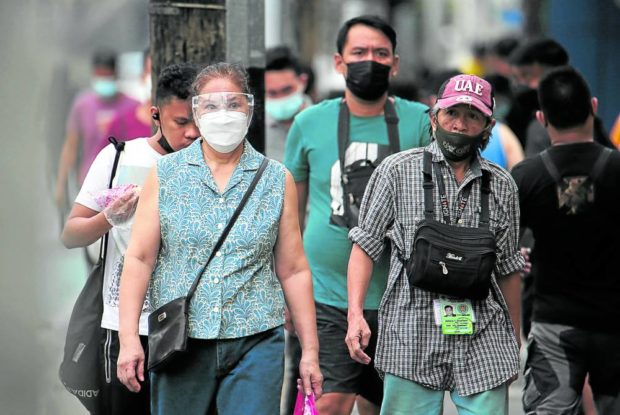It’s mask on in Cebu as IATF rule to prevail, says DOJ chief

PROTECTION | Health officials are encouraging people not to discard their face masks as these will continue to protect them from COVID-19 despite the improving public health situation in recent months. (Photo by NIÑO JESUS ORBETA / Philippine Daily Inquirer)
MANILA, Philippines — The order of the Cabinet-led pandemic task force on the mandatory wearing of face masks against COVID-19 will prevail over that of the Cebu provincial governor’s optional wearing of face masks, Justice Secretary Menardo Guevarra said on Monday.
Guevarra said the orders of the Inter-Agency Task Force for the Management of Emerging Infectious Diseases (IATF) were backed by President Rodrigo Duterte’s own orders.
“The IATF resolutions on the mandatory wearing of face masks, whether indoor or outdoor, are incorporated in and/or enabled by executive orders issued by the president. As between an executive order issued by the president, as manifested in resolutions issued by the IATF composed of alter egos of the president, on one hand, and executive orders issued by local government units, on the other hand, the former shall prevail,” he stressed.
Guevarra cited Section 4, Article X of the Constitution which states the President exercises “general supervision” over local governments.
On June 9, Cebu Gov. Gwendolyn Garcia issued Executive Order No. 16 that dropped the mandatory wearing of face masks in outdoor and well-ventilated areas in the province, retaining the mask mandate only in indoor and poorly ventilated areas.
Article continues after this advertisementHowever, Interior Secretary Eduardo Año overruled Garcia by issuing his own order to the police to arrest and penalize individuals who would follow the Cebu governor’s order.
Article continues after this advertisementThe Department of the Interior and Local Government also said on Monday that it would issue a show-cause order to Garcia as a “last step” if the local government’s policy on face masks stays unaligned with the national government.
Health experts’ decision
“But in the meantime, we will have to ask our official to talk to the good governor to make some adjustments in the EO,” DILG Undersecretary Epimaco Densing III said at the Laging Handa briefing.
Senators on Monday also noted that decisions on whether the government should retain the rule requiring wearing face masks should be left to health experts, who should likewise be ready with recommendations should there be a new spike in COVID-19 cases.
Outgoing Senate President Vicente Sotto III said that any national or local policy pertaining to handling the health crisis, such as the need for citizens to keep wearing face masks, should be science-based and data-driven.
Sen. Imee Marcos, outgoing chair of the Senate committee on economic affairs, backed the continued wearing of face masks.
“I think living with COVID-19 will include wearing a face mask in crowded, enclosed spaces, as many countries learned during the (severe acute respiratory syndrome) and other contagions,” she said.
“The DOH (Department of Health) is mandated to recommend what would be best suited for any health crisis situation. They are the health experts. It is a balancing act of properly disseminating the correct information but at the same time, not causing any panic,” said returning Sen. JV Ejercito.
Sen. Sherwin Gatchalian, meanwhile, sided with Cebu province’s decision to make the wearing of masks in public optional.
“Learning from my visit to Singapore, they no longer require masks when outdoors and the convention centers and restaurants are at full capacity. The effect is a resurgence of their tourism industry to shore up government revenues,” he said.
Higher alert level
As this developed, the DOH said placing Metro Manila under a tighter alert level 2 was a possibility with the noted increase in COVID-19 cases in recent days (See related story on this page), which Albay Rep. Joey Salceda on Monday warned could cause 640,000 families in the National Capital Region (NCR) to go hungry.
The lawmaker stressed that further restrictions on economic activities were not necessary even if there was an increase in infections.
“At this point, the alert level system, which is primarily based on the number of COVID-19 cases, no longer makes sense from a healthcare point of view. Cases will always be there, so we have to measure our ability to live with the cases,” Salceda pointed out.
He cited EO 166 series of 2022, signed in March, which seeks to accelerate and sustain economic recovery from the COVID-19 pandemic.
“EO 166 already prescribes that we use more useful and empowering metrics for decision-making on COVID-19. It explicitly instructs that we use both total and severe cases, case fatality, and vaccination rates for decisions on restrictions. So, I don’t understand this talk that a rise in cases might necessitate a higher alert level,” he said.
He stressed: “That EO is already the law. So, we should be changing paradigms.”
“I also remind the [IATF] that every week in lockdown in NCR costs workers around P1.6 billion in salaries,” Salceda said. “If they have no plan for how to replace the nutrition, non-COVID health, and welfare losses from that, then we should be more circumspect about declaring alert levels.”
—WITH A REPORT FROM JEANNETTE I. ANDRADE
RELATED STORIES
Cebu’s optional face mask rule stays; Garcia warns vs arrest of ‘unmasked’
Mask on or off? Even Cebu top cops are split